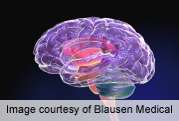Neurocognitive deficits seen within days of T1DM diagnosis

(HealthDay)—Deficits in neurocognitive functioning are evident within days of a type 1 diabetes diagnosis in children and are associated with glycemic control over one year postdiagnosis, according to a study published online June 26 in Diabetes Care.
David D. Schwartz, from the Baylor College of Medicine in Houston, and colleagues conducted neuropsychological testing among 147 children/adolescents (aged 5 to 18 years) during their inpatient hospitalization for new-onset type 1 diabetes. Comparisons were made to normative data, and they examined associations between neurocognitive performance at diagnosis and glycemic control one year postdiagnosis.
The researchers found that on most cognitive measures, children with type 1 diabetes performed significantly below expectations (P values < 0.0001). Specifically, large decrements were seen in psychomotor speed, visuomotor integration, and phonemic fluency, compared to the normative mean. All tasks except digit span showed a high incidence of impairment (scores less than second percentile). When controlling for race/ethnicity, sex, and reading ability there was a significant association between dominant-hand psychomotor speed and poor glycemic control (hemoglobin A1c ≥9.5 percent [80 mmol/mol]; P = 0.032) one year postdiagnosis. There was a 0.77 percent increase in mean hemoglobin A1c in association with impaired psychomotor speed.
"Psychomotor impairment may be an early marker for a broader neurobehavioral vulnerability that has implications for long-term diabetes management," the authors write.
More information:
Abstract
Full Text (subscription or payment may be required)
Copyright © 2014 HealthDay. All rights reserved.


















